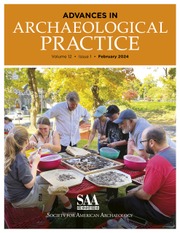Article contents
Applying Risk Management Concepts from CRM and the Outdoor Recreation Industry to Academic Archaeology Projects
Published online by Cambridge University Press: 11 March 2021
Abstract
Field safety is being taken more seriously across the cultural resource management (CRM) industry as CRM companies seek to be in compliance with their clients’ health and safety programs and to keep employees safe. Many universities also have organizational health and safety programs designed to protect students and employees, but academic archaeology is routinely conducted without adequate risk management planning. Risk management will be a workplace concern for aspiring archaeologists after graduating from college, which is why it is important for academic archaeology to meet industry standards. Archaeology can learn a great deal about fieldwork risk management from the outdoor recreation industry, which emphasizes building leadership skills rather than following proscribed rules and regulations to mitigate the myriad hazards in the field. This article provides some suggestions that academic archaeologists can use to apply risk management concepts from CRM and the outdoor recreation industry to academic projects in order to comply with university requirements and the Occupational Safety and Health Administration (OSHA), as well as to teach students how to be safe in the field.
La seguridad en el campo está tomando mayor importancia dentro de la industria de gestión de recursos culturales (CRM), esto se debe a que las empresas de CRM buscan cumplir con los programas de salud y seguridad de sus clientes. Muchas universidades además cuentan con programas organizacionales de salud y seguridad diseñados para proteger a los estudiantes y empleados. Sin embargo, la arqueología académica generalmente se realiza de manera rutinaria y sin una planificación adecuada de la gestión de riesgos. La gestión de riesgos será una preocupación laboral para los aspirantes a arqueólogos después de graduarse de la universidad, por lo que es importante que la arqueología académica cumpla con los estándares de la industria. Tanto la industria de CRM como la academia pueden aprender mucho de la industria de recreación al aire libre en lo referente a la gestión de riesgos del trabajo de campo, pues posee gran cantidad de datos sobre peligros, lesiones al aire libre y una vasta experiencia en el manejo de estudiantes en el campo. Este artículo proporciona algunas sugerencias que los arqueólogos académicos pueden utilizar para aplicar conceptos de la industria de recreación al aire libre y de gestión de riesgos de CRM en proyectos académicos, a fin de cumplir con los requisitos de la universidad y requisitos Occupational Safety and Health Administration (OSHA) y enseñar a los estudiantes cómo mantenerse seguros en el campo.
Keywords
- Type
- How to Series
- Information
- Advances in Archaeological Practice , Volume 9 , Special Issue 1: Health and Wellness in Archaeology: Improving Readiness and Response , February 2021 , pp. 61 - 65
- Copyright
- Copyright © The Author(s), 2021. Published by Cambridge University Press on behalf of Society for American Archaeology
References
REFERENCES CITED
- 4
- Cited by




